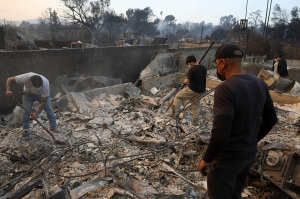Mexican Cartel Queen Pleads Guilty, Faces 15 Years in Drug Trafficking Case
A woman from Mexico who was described as a drug cartel "queen" pleaded guilty to charges related to a major cocaine trafficking ring.
Court records indicate that Sandra Avila Beltran pleaded guilty Tuesday in Miami to being an accessory after the fact in an organization once headed by Juan Diego Espinosa Ramirez, one of the most notorious cartel leaders from Mexico.
Beltran was reportedly romantically involved with Ramirez.
Ramirez was the former leader of Mexico's Sinaloa cartel, but he pleaded guilty in 2009 to cocaine trafficking charges.
Beltran, who was known as the "Queen of the Pacific," detailed in a sworn affidavit that she provided money to Espinosa so that he would be able to evade U.S. authorities while he was being pursued between 2002 and 2004.
The 52-year-old Beltran faces a maximum of 15 years in prison when she appears at a July 25 sentencing hearing. She is expected to receive a much lighter sentence, given that she served six years in a Mexican prison before being extradited to the U.S. last August.
"Both sides felt the charge of accessory after the fact would be reflective of a fair and just result," Beltran's attorney, Howard Schumacher, told The Miami Herald.
Beltran stood out in the drug world that was dominated by men and she has long been the attention of international news agencies since she was captured in 2007 in southern Mexico.
As pressure mounts on the drug trade, they are becoming increasing violent and targeting journalists and others on social media who cover them.
The move by cartels to target social media users is the latest step by criminal organizations to control information in a conflict that has killed tens of thousands in Mexico. Violence erupted in 2006 when Mexican President Felipe Calderón unofficially declared war on the drug gangs.
More than 80 journalists have been killed in Mexico since 2000, largely for their role in reporting on drug-related and cartel stories, according to Reporters Without Borders, an international press freedom organization.





























